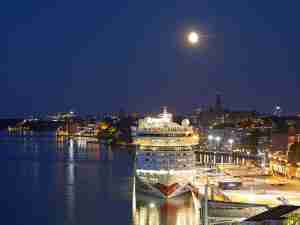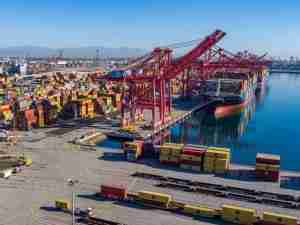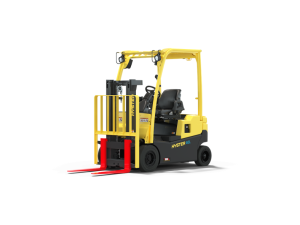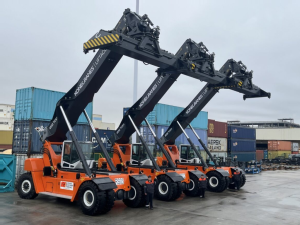With cargo continuing to move smoothly, an unprecedented air quality program to slash air pollution from trucks began -- Wednesday, October 1, 2008 -- at the Port of Long Beach as older, dirtier big rigs were phased out of Port service.
Nearly all trucks or more than 95 percent of the thousands of vehicles arriving at the shipping terminals Wednesday displayed bright orange stickers on their windshields, signifying their participation and compliance with the Port's new Clean Trucks Program. Trucks without the compliance stickers were turned away. Truck traffic volumes, a little lighter than usual in the morning, was at or near normal levels by mid-day.
Truckers who work infrequently at the Port could sign up for temporary access permits. By mid-day Wednesday, less than 70 had obtained a "day pass."
Beginning Wednesday, trucks built in 1988 or earlier? the most polluting vehicles -- are banned from Port terminals. The Clean Trucks Program will progressively phase out older trucks until 2012, when only the cleanest, 2007 EPA-certified trucks can serve the Port. With the oldest trucks banned and owners busily purchasing new trucks to comply with future deadlines, the air quality improvements at the Port have already begun.
By January 1, 2012 Clean Trucks Program will have slashed Port truck-related emissions by 80 percent from current levels.
"With the start of the Clean Trucks Program, the Port of Long Beach is living up to its Green Port Policy commitments to improve air quality for our community," said James C. Hankla, President of the Board of Long Beach Harbor Commissioners. "We salute our trucking and shipping industry partners for assisting with this historic initiative."
Already more than 750 trucking firms, representing about 15,000 drayage drivers and trucks, have registered under the Port's truck concession system, qualifying them for the orange terminal access stickers. The concession agreements set down the rules that the drivers and trucking companies must follow to do business at the Port.
The concession agreements establish the environmental and security provisions at the heart of the Clean Trucks Program. They guarantee that trucks meet the Port's environmental standards, and that drivers obtain a federal Transportation Worker Identification Credential, which requires an extensive background security check. And through the Healthy Drivers Program, the Port is helping drayage truck drivers obtain health insurance for themselves and their dependents.
In order to ensure a smooth transition and the uninterrupted flow of cargo, the Port has held several workshops to inform the trucking industry about the Clean Trucks Program. The Port has set up a Clean Trucks Center on Terminal Island and a web site at www.polb.com/cleantrucks.
"The trucking industry understands that the Clean Trucks Program is a vital part of the air quality improvements we need make in order to redevelop and improve the Port of Long Beach," Hankla said.
The ports of Long Beach and Los Angeles have established a $35 per TEU (twenty-foot equivalent unit) fee on each loaded cargo container coming out of or going into a Port terminal to finance the majority of the estimated $2 billion for the Clean Trucks Program. The collection of the "Clean Trucks Fee" will start with the implementation of the new "PortCheck" program in a few weeks. The revenue from the fee will help pay for the replacement or retrofitting of older trucks. The fee is to be paid by the owner of the cargo. Certain clean trucks financed independently are exempt or partially exempt from the fee.
In the Port of Long Beach's Clean Trucks Program, trucking firms with the Port-approved concessions can dispatch either employee drivers or independent owner-operators to haul loads to and from Port terminals.









